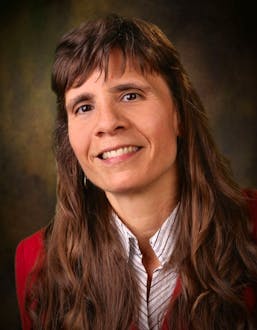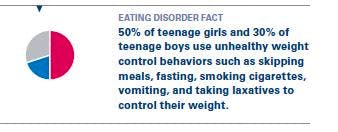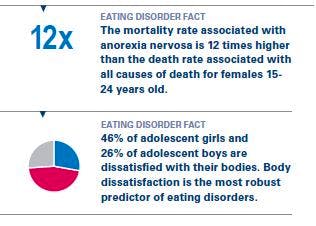Family, Friends May Hold Key to Eating Disorder Recovery
By Nora Hicks
Friday, November 11, 2016
UR Nursing researcher says multifamily therapy can help repair disconnections that obstruct healing process
For people with eating disorders, everyday life can be overwhelming. In order to avoid situations that cause stress or anxiety, including talking about their disease, they have a tendency to isolate themselves and cut off communication with others while simultaneously focusing on something they alone can control: their weight or body size.
To help people with eating disorders overcome their disease, Mary Tantillo, PhD, PMHCNS-BC FAED, CGP, professor of clinical nursing at the University of Rochester School of Nursing and director of the Western New York Comprehensive Care Center for Eating Disorders (WNYCCCED), suggests a new approach. 
Based on her 30 years of experience working with patients with eating disorders and their families, Tantillo has devised a new 26-week treatment method that targets those disconnections. Her “Reconnecting for Recovery” multifamily therapy group focuses on emotions and relationships, rather than eating disorder behaviors and thoughts. She says that establishing a strong connection and repairing relationships with family and close friends is central to promoting ongoing recovery by maximizing the resources, strengths, and coping strategies of a patient and their family members.
“Eating disorders are diseases of disconnection,” Tantillo said. “Multifamily therapy group creates a therapeutic village where people with eating disorders and their families and friends can learn and practice emotional and relational skills to foster these reconnections.”
While there is no one exact “cause” of eating disorders, research indicates that people who develop eating disorders often have low self-esteem, over-concern about body shape and weight, and a level of perfectionism that makes them very hard on themselves. Research has also shown that interpersonal problems and negative mood can influence use of eating disorder behaviors in an effort to achieve the “perfect” weight/shape. When these processes interact over time and the genetically vulnerable person experiences stress in their everyday life, they can go on to have an eating disorder.
Eating disorders affect as many as 11 million people in the country and have the highest mortality rate of any psychiatric disorder. Up until recently, treatments for eating disorders focused mainly on eating disorder behaviors like food restriction, compulsive over-exercise, binge eating, and purging, as well as the unhealthy eating disorder thoughts.
Instead of focusing mainly on trying to change these unhealthy thoughts and behaviors, which typically does not lead to a sustained recovery, Tantillo says multifamily therapy group can help the person tackle the disease by focusing on reconnecting with their own feelings, thoughts and their relationships with others, removing a key barrier to active recovery.

For multifamily therapy group, the individual with an eating disorder identifies family members or friends who join them in sessions with other families in the same situation. Tantillo says she facilitates the conversation – helping the group to identify the disconnections created by the illness and develop the skills required to name their feelings, and how to deal with them.
“Dealing with painful emotions is like riding a wave. The illness sucks them in, but when they’re with other people who want to understand how they feel, it helps dissipate the shame and anxiety. It’s about helping that person to better understand themselves and join forces with others to reconnect with their own genuine needs, feelings and thoughts.”
With assistance from the Hilda and Preston Davis Foundation, Tantillo has completed the first 26-week group cycle of the study and is currently recruiting for a second group of participants. If you or a loved one are between the ages of 18-40, struggling with anorexia nervosa or a related eating disorder and are interested in participating in this study, please contact Judy Brasch, study coordinator, at 585-275-6629. Eligible individuals will need to identify between one and four adult family members who would be willing to participate with the individual in the group.
Categories: Community, Clinical Experience


